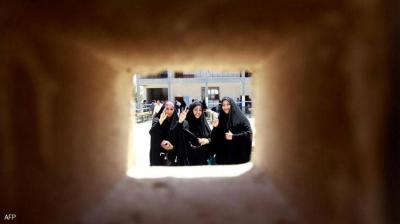Under the title "Iraqi Women in the Electoral Arena: Between Mobilization and Marginalization," Sky News published a special report indicating that despite the opportunities for women to participate in general elections, both in voting and running for office, and the allocation of a 25% female quota of the total 329 seats in the Iraqi Parliament, Iraqi women still face tremendous obstacles, particularly independent candidates. Most candidates suffer from various forms of harassment and targeting, stemming from a prevalent mindset that excludes women and undermines their ability to play an active and significant role in the public and political sphere, according to testimonies from among them.
The targeting and restrictions, both material and moral, against female candidates in the general elections manifest in numerous ways, particularly through electronic social networks, including defamation and the fabrication of false stories about candidates, reaching the point of tearing down their images and campaign posters in public spaces. Observers note that female candidates in Iraq generally suffer from discrimination, but independent candidates, who lack political or party support, face compounded difficulties, quickly becoming easy prey for mobilization campaigns against them and attempts to undermine their efforts.
Commenting on the challenges Iraqi women face in the electoral arena, candidate and lawyer Sarah Tawfiq Al-Salhi stated in an interview with Sky News Arabia: "Parliamentary elections are, by nature, a democratic process by which the public chooses its representatives, which makes women's participation in this process one of its most critical pillars. However, elections in Iraq have not yet crystallized correctly and need a long time to become a common culture within society so that the public understands its laws, regulations, and mechanisms. This has delayed the process of democratic transformation and, consequently, weakened women's role in political participation and entering elections."
The Iraqi candidate from Basra in southern Iraq added: "Unfortunately, the culture of Iraqi society is still permeated with rigid thinking regarding women's political participation. For instance, some families still do not Allow women to participate in public life, such as accessing job opportunities or enjoying the right to education under the pretext of customs and traditions. They even do not allow women to participate in voting rights, so how can such a culture view women's representation in parliamentary councils and holding political and leadership positions? Therefore, we find that women's participation is symbolic in Iraqi political life, and it is essential to mobilize women and supportive men for women's rights to bring about change, ensuring women's involvement in decision-making processes and holding political positions, representing women in the three main authorities: legislative, executive, and judicial."
Despite the difficulties and obstacles women must overcome if they wish to engage in politics, primarily related to their own circumstances and economic status, as well as societal and cultural factors, candidate Sarah Al-Salhi further explained: "If we take the example of women's participation in the electoral process, we find that women often cannot easily access even the legitimate funding for electoral campaigns. Furthermore, the influence and exchange of material and political interests that women must contend with, alongside some forms of extremist discourse and defamation, negatively affect society's acceptance of women and the lack of trust from Iraqi female voters in women themselves, leading to conformity with the desires of surrounding men. Additionally, many women voters tend to refrain from supporting female candidates in elections."
In light of this, it is essential to emphasize women's role in the political and electoral process. Al-Salhi states, "This involves preparing a generation of women capable of holding political positions, participating and influencing decision-making, and emphasizing the importance of training women to ensure that unqualified women do not reach leadership positions, with a focus on women working within parties and participating in elections both by voting and running."
On the other hand, a political source in Iraq, who preferred not to be named, stated in an interview with Sky News Arabia: "The situation is relative, but generally, yes, there are obstacles to female candidates' participation in various regions, especially in provinces under the influence of religious parties and their sectarian militias, which disapprove of the evolving role and participation of women in Iraqi political life." Although such hardline factions usually nominate women within their lists, it is under their specific conditions and their preconceived image of women. The political source added, "For these entities, involving women is merely decorative and does not reflect any genuine belief in the necessity of women's participation and empowerment."
The number of candidates for the upcoming Iraqi elections is 951 out of more than 3,200 candidates who will contest the general elections scheduled for next Sunday. The last parliamentary elections in 2018 witnessed a broader participation of women, with nearly 2,000 candidates, which represents almost double the current number of candidates in this electoral cycle set to occur in less than a week.




